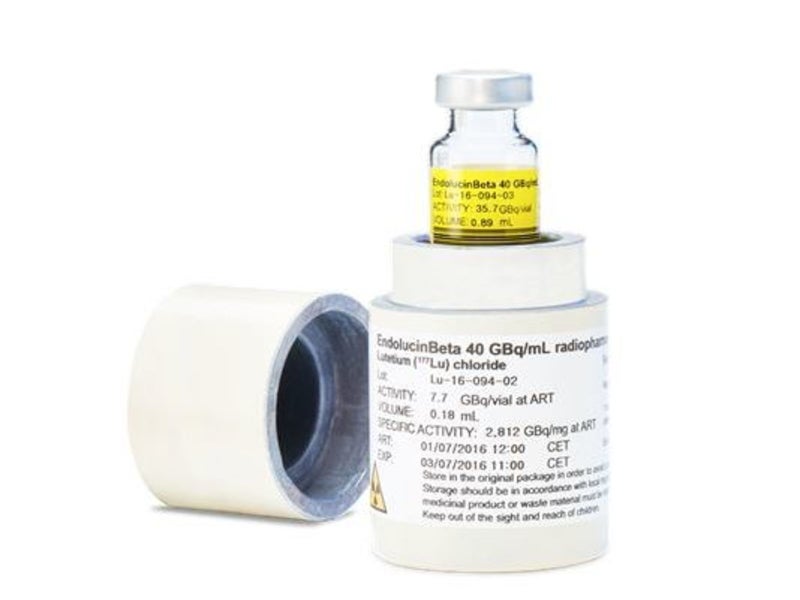Pluvicto™ (lutetium Lu 177 vipivotide tetraxetan) is a radiopharmaceutical indicated for the treatment of progressive, prostate-specific membrane antigen-positive, metastatic, castration-resistant prostate cancer (PSMA+ mCRPC) in adults.
Developed by Advanced Accelerator Applications, a Novartis company, the drug is a novel targeted radioligand therapy (RLT) that is to be administered to patients pre-treated with androgen receptor pathway inhibitors (ARPI) and taxane-based chemotherapy.
German radiopharmaceutical company Isotopen Technologien Munchen (ITM) supplies the pure medical radioisotope no-carrier-added (nca) 177Lu (EndolucinBeta®), a core component of Pluvicto, to Advanced Accelerator Applications for the commercial-scale development of the therapy, based on a supply agreement signed between the two in March 2020.
The agreement aimed to support the drug’s scalability and supply security, as well as the future pipeline investigations of Novartis.
Pluvicto is available in a single-dose vial as a clear, colourless-to-slightly-yellow solution of 1,000 megabecquerel/ml (27 millicurie/ml) lutetium Lu 177 vipivotide tetraxetan for intravenous administration.
Regulatory approvals for Pluvicto
The US Food and Drug Administration (FDA) approved Pluvicto for the treatment of PSMA+ mCRPC in March 2022. The FDA also approved the complementary radioactive diagnostic imaging agent Locametz® (active ingredient gallium Ga 68 gozetotide) to identify PSMA+ lesions using the positron emission tomography technique, to select eligible patients for Pluvicto therapy.
The European Commission (EC) approved Pluvicto in combination with androgen deprivation therapy (ADT) with or without androgen receptor pathway inhibition for the treatment of adult patients with (PSMA)+ (mCRPC) in December 2022.
The drug is also approved in Great Britain and Canada.
Prostate cancer signs and symptoms
Prostate cancer occurs due to the development and growth of abnormal cells in the prostate gland.
mCRPC is an advanced form of prostate cancer that spreads beyond the prostate to other organs such as the lymph nodes, bones, bladder, rectum, and liver. The individual with mCRPC stops responding to hormone treatment known as androgen deprivation therapy (ADT).
Prostate cancer may remain asymptomatic in the early stages, while in the advanced stages, it may show signs and symptoms such as trouble in urinating, reduced force in the stream of urine, blood in urine and/or semen, pain in the bones, weight loss, and erectile dysfunction.
Pluvicto’s mechanism of action
Pluvicto is a PSMA-targeted precision cancer treatment combining ligand, a targeting compound, with therapeutic radioisotope lutetium-177, a radioactive particle. PSMA is a transmembrane protein overexpressed in most individuals with prostate cancer.
The ligand part of Pluvicto binds to the PSMA-expressing cells, while the beta-minus emission from lutetium-177 releases radiation to the cancer cells, destroying their replicating ability and that of the surrounding cells, thereby triggering cell death.
Clinical trials on Pluvicto
Pluvicto’s approval in the US and Europe was based on the results from a randomised, multi-centre, open-label, Phase III clinical trial named VISION.
The VISION trial enrolled 831 PSMA+ mCRPC patients, who have received ARPI and taxane-based chemotherapy, to evaluate the safety and efficacy of Pluvicto plus the best standard of care (BSoC) against BSoC alone. The patients were randomised at a 2:1 ratio to receive Pluvicto 7.4 gigabecquerel (GBq) every six weeks for a maximum of six cycles, plus BSoC or BSoC alone.
The study’s primary endpoints were overall survival (OS) and radiographic progression-free survival (rPFS).
The clinical trial showed a statistically significant improvement in both OS and rPFS in patients treated with Pluvicto plus BSoC, compared with patients treated with BSoC alone. The median OS in patients treated with Pluvicto plus BSoC was 15.3 months, compared with 11.3 months in the BSoC arm.
The patients treated with Pluvicto plus BSoC achieved a 38% reduction in risk of death compared to BSoC alone.
The most common adverse events reported in the trial were fatigue, dry mouth, nausea, anaemia, decreased appetite, and constipation.
Additional clinical studies on Pluvicto
A pivotal Phase III, open-label, multi-centre, randomised clinical study, named PSMAfore, was conducted for Pluvicto after the VISION study, to evaluate the efficacy and safety of Pluvicto to a change in ARPI in patients with PSMA+ mCRPC.
A total of 469 patients with PSMA+ mCRPC and pre-treated with ARPI therapy were recruited in the clinical study. The primary endpoint of the study was rPFS in patients.
Pluvicto showed a statistically and clinically significant improvement in rPFS in patients with PSMA+ mCRPC following ARPI treatment, compared to a change in ARPI.
The positive outcomes of the study made Pluvicto the first PSMA-targeted radioligand therapy to show significant and clinically meaningful benefits for patients with PSMA+ mCRPC who have not received taxane-based chemotherapy.





